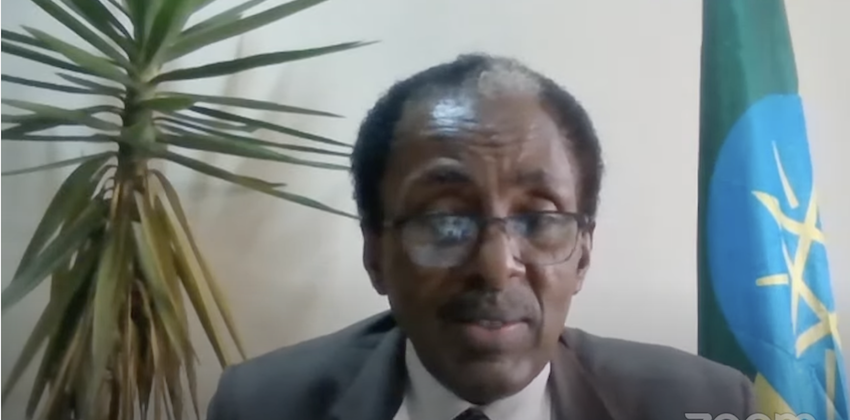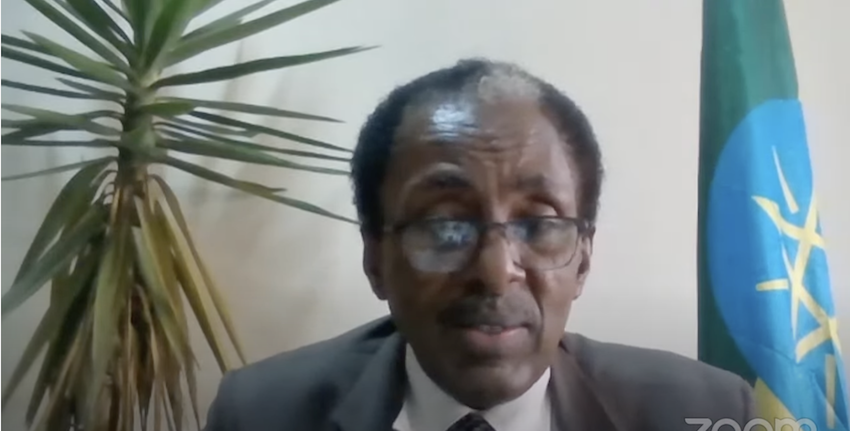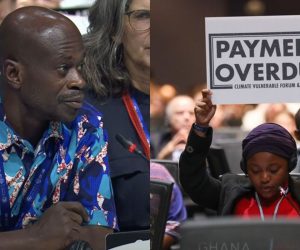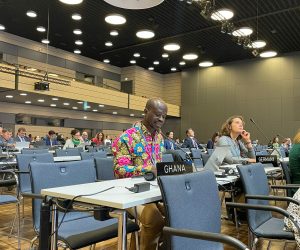2021 CVF Africa & Middle East Regional Communique

H.E. Pr. Fekadu Beyene Aleka, Commissioner, Commission of Environment, Forest and Climate Change of Ethiopia, chaired the Ministerial segment of the CVF Africa & Middle East Regional Dialogue.
2021 CVF AFRICA & MIDDLE EAST REGIONAL COMMUNIQUE
Climate Vulnerable Forum Regional Dialogue for Africa & Middle East
29 July 2021
Version: Adopted
We, Ministers and Senior Representatives, members, and observer nations, of the Climate Vulnerable Forum (CVF) from Africa & the Middle East, representing a significant number, and a representative group, of those countries most vulnerable and suffering due to the adverse impacts of climate change in our region though least responsible for the climate crisis, have adopted 12 recommendations for improving the response to the climate crisis at our Regional Dialogue of the CVF for Africa & the Middle East held on 27-29 July 2021.
The second in a series of regional to global cooperation activities of the CVF being held in 2021 in the lead up to the October-November 2021 United Nations Climate Change Conference (UNFCCC COP26) in Glasgow, the CVF Africa & the Middle East Regional Dialogue was co-hosted by Bangladesh, in its role as CVF Chair, and Ethiopia, and organized in cooperation with the Global Center on Adaptation.
The 25 participating governments from Africa & the Middle East included: Benin, Burundi, Chad, Democratic Republic of Congo, Djibouti, Eswatini, Ethiopia, Gambia, Ghana, Guinea, Lebanon, Lesotho, Liberia, Madagascar, Morocco, Mozambique, Niger, Palestine, Rwanda, Senegal, Sierra Leone, South Sudan, Togo, Uganda, and Yemen.
The 12 recommendations aimed at stimulating national, regional and global advances stemmed from the Regional Dialogue’s review of shared challenges, gaps and success stories in the Africa & Middle East region’s experiences in dealing with a mounting climate crisis, as follows:
COP26 PRIORITIES
We need to see action on the climate emergency at COP26 with a clear pact for ambition and finance delivery in global solidarity.
We, moreover, look forward to the full substantiation and operationalization of the Paris Agreement Global Goal on Adaptation as a top priority for our most vulnerable nations, struggling on the frontline of fast worsening worldwide climate crisis.
We supported the CVF priorities for COP26, in the following specific areas:
1.Delivery Plan of the annual $100 Billion: Following the 1st Climate Vulnerable’s Finance Summit, we call for developed countries to come forward with a clear Delivery Plan for the promised $500 billion of balanced climate finance for adaptation and mitigation for the 5-year period 2020 to 2024. Provision of the annual commitment of developed country parties to mobilize $ 100 USD billion climate finance annually to developing countries is critical to enabling action and sustaining trust in international cooperation. We are concerned that developed countries have not yet to meet their climate finance goal and call to those parties to scale-up climate finance both for adaptation and mitigation and enhance the quality and composition of it while providing at least 50% of public funds towards adaptation in order to correct the large-scale imbalance and gap of funding for adaptation and resilience as our countries suffer on the front-line. International climate finance should be additional to Official Development Assistance (ODA) flow commitments and at minimum be 50:50 adaptation-mitigation with priority for adaptation, given the humanitarian situation created by climate change. Such climate finance should significantly strengthen funding to the Adaptation Fund, Global Environment Facility (GEF) and Green Climate Fund (GEF). Improved transparency on how much is being provided and reaching developing countries, as well as better predictability, accessibility, and adequately provided of finance is also vital. In particular, pledged mitigation and adaptation funds must reach all developing countries and vulnerability criteria for resource allocation, moving beyond GDP per capita criteria, should be included in the formal decision making within the GEF, GCF and regional and international multilateral development banks. We recall the recent OECD figures indicate that we are still a significant way off from achieving this goal as the total amount provided and mobilized in 2018, 2017 and 2016 was USD 78.9 billion, USD 71.2 billion and 58.2 billion, respectively. OECD findings on climate finance, moreover, have also indicated that, between the years 2013-2018, the share of loans in public climate finance increased from 52 percent to 74 percent while the share of grants decreased from 27 percent to 20 percent. Given the debt crisis that vulnerable countries are faced with currently, it is especially crucial that long- term climate finance pledges are mainly on grant basis. We need help to lessen our debt burden including to free up the necessary fiscal space needed to support a green recovery from the COVID-19 pandemic and towards achieving sustainable development.
2. Greater Ambition from Major Emitters: The social, environmental and economic security of Africa & the Middle East requires safeguarding of the 1.5 degrees Celsius Paris Agreement goal to limiting warming. Even 1.5 degrees Celsius (1.5ºC) of warming poses catastrophic risks for the region. Action is especially needed by major emitters given the most recently upgraded Nationally Determined Contributions (NDCs) concern only around half of all GHG emissions. Countries who have yet to upgrade NDCs in 2020-21 should do so prior to COP26. If a shortfall in ambition remains to safeguard 1.5ºC, new ambition-raising timeframes and platforms prior to the next, already mandated NDC submission deadline of 2025 should be set by COP26. Improved transparency, especially of NDCs and their implementation, is needed with countries presenting information in a consistent, robust and clear way via the common tabular formats, to assist understanding of what has been committed and delivered. We, moreover, welcome the July 2021 G20 communique on Environment, Climate and Energy, which affirmed the commitment of all G20 members to come forward with ambitious new or updated Paris Agreement NDCs before COP26.
3. Imperative of New Financing: According to the Global Commission on Adaptation, financing needs for adaptation and resilience are $1.8 trillion this decade. As least developed, small islands and vulnerable middle-income nations with limited fiscal space, facing high costs of capital and states of debt distress, even a fair share of the $100 billion annual developed country climate finance support will be insufficient, with best national efforts, to mobilize the necessary finance for climate action. Furthermore, additional financing is needed to avert, minimize and address loss and damage in the context of the adverse impacts of climate change, including displacement. In addition, we call on all parties to the UNFCCC to start formal negotiations at COP26 on the New Collective Quantified Goal on Climate Finance from a floor of $100 USD billion from 2025 on with a view to effectively support climate action in developing countries in the transition to 1.5ºC and align finance flows with a pathway towards low greenhouse gases emissions and climate-resilient development. These negotiations must also include innovative ways to provide improved quality and accessibility of climate finance, including by making finance flows consistent with a pathway towards low greenhouse gas emissions and climate-resilient development and acknowledge all the opportunities therein to source more resources towards more effective climate action, as well as the need to move from billions to trillions of financial support to close the mitigation and adaptation gaps in developing countries.
4. Carbon Markets: Furthermore, at COP26 we need to finalize robust carbon markets and a rulebook that ensures environmental integrity consistent with 1.5ºC to unlock new finance streams while the carbon markets regime should raise at least 5% proceeds to support the adaptation actions of developing countries particularly vulnerable to climate change. We believe that an integral approach to long-lasting sustainable development should take climate change and climate-related risk into account in macroeconomic policy, fiscal planning, budgeting, public investment management, and procurement practices.
We also called for the following actions in relation to COP26:
5. Loss & Damage: In addition to the need for financing of loss and damage, COP26 needs to place a higher level of prioritization on loss and damage and the work of the Warsaw International Mechanism (WIM). We support the call of the CVF Chair to ensure that loss and damage is devoted the necessary discussion space as part of the COP/CMA agenda as a standing item. All arrangements for the Santiago Network on Loss and Damage (SNLD) should be made operational at COP26 so as to commence catalyzing technical assistance for implementing approaches to avert, minimize and address loss and damage. The SNLD must first and foremost address the primary needs identified by developing countries, including a lack of capacity, and lack of finance and support, and particularly catalyse support for local, grassroots, and subnational-level initiatives. The process to operationalize the SNLD must be driven by Parties and centered upon the needs of vulnerable developing countries, and it must be inclusive and transparent. The presidency will facilitate the discussions to be inclusive and balanced to ensure an adequate outcome. Adequate resources must be dedicated in the WIM and the SNLD for capacity, action and support to avert, minimize and address displacement in the context of climate change, according to the needs of affected Parties.
6. Further Means of Implementation: High priority was emphasized around the importance of capacity building and technology transfer and development for supporting the realization of ambition on the ground in actions to build climate resilience and advance climate action on all fronts. The international community and COP26 was called upon to advance ambitious enhancements not only in the domain of finance but also in capacity building and technology in order to support more effective implementation of the Paris Agreement.
FURTHER PRIORITIES
We, moreover, highlighted a number of other headline priorities for the Africa & the Middle East region, as follows:
7. Africa Adaptation Acceleration Initiative: We called for donors and international and regional collaboration to prioritize efforts to deliver on the Africa Adaptation Acceleration Initiative which aims to implement the vision of the African Union’s Africa Adaptation Initiative by scaling up and accelerating climate adaptation in Africa. Supporting climate adaptation is a core component of the Paris Agreement and we call on the international community to redeem all pledged commitments.
8. Worker Protection & Jobs: We call upon partners to consider the need for urgent capacity, finance, technology and technical assistance to help protect workers in the Africa & the Middle East region exposed to dangerous effects due to climate change, including extreme heat, slow onset disasters and other impacts. We also call for a prioritization of support for re-skilling and up-skilling of workers and social safety net support to enable a just transition as we pursue low-carbon and carbon neutral development under the Paris Agreement.
9. Displacement & Migration: We call increased support to the Africa & the Middle East region to help most vulnerable communities to increase their resilience to sudden-onset disasters and slow-onset events due to climate change. We need to help communities to avoid disaster displacement, to support adaptation and to safeguard and promote local jobs and livelihoods. Where displacement and migration driven by climate change is unavoidable, we call on international support to assist and protect the growing number of climate displaced persons and migrants in our region.
10. Human Rights: Following the resolution of the 47th Human Rights Council on climate change and human rights, we call upon all Council members to work actively and in full urgency towards the establishment of a dedicated Special Rapporteur mandate procedure of the Council on human rights and climate change, to begin its work as soon as practicable. This is an urgent need for the most vulnerable given the importance of human rights in the climate crisis and the planetary emergency that is already and increasingly threatening and undermining the rights of all our people, and especially most vulnerable groups, including women, children, persons with disabilities and indigenous people. As we suffer ever more extreme climate disasters, we are faced with the international community’s most alarming human rights challenge, which requires stronger responses aimed at promoting climate justice.
11. Parliaments: We encourage the active engagement of parliamentarians of Africa & the Middle East in the CVF Parliamentary Forum to benefit from the exchange of legislative good practices for effective national and locally-led efforts on climate change and to enhance international engagement and cooperation with the legislative bodies of major economies on climate action. We call on those Africa & the Middle East Parliaments who have not yet done so, to ratify the Regional Agreement on Access to Information, Public Participation and Justice in Environmental Matters in Latin America and the Caribbean. In addition, the CVF is encouraged to also develop its work into the area of enforcement of policies and regulations, to effectively ensure the implementation of the work of parliaments in strengthening climate responses.
12. Environment: Recognizing that the climate crisis is also an ecological crisis and that nature-based solutions and the protection of nature need to be strengthened to enhance the response to climate change, we urge the IUCN World Conservation Congress at Marseille, France, on 3-11 September 2021 to establish a new Commission with the working title of ‘The Climate Crisis Commission’, per motion 003 before the Congress. Such a Commission could, importantly, leverage to a fuller extent the capacities of the international environmental community towards the protection and promotion of the resilience of nature under rapidly growing threats due to climate change, mobilize support for critical ecosystems and vulnerable communities that rely on them, and promote bolder global response to tackle climate change.
CHALLENGES & CONCERNS
The CVF Africa & Middle East Regional Dialogue also highlighted the devastating impacts that climate change has historically caused in the region, causing significant damages to vulnerable populations, impacting their populations and the economy. In particular, consideration was given to the destructive impacts of the locust infestation in 2021 throughout the horn of Africa and the Middle East. As part of the main impacts of climate change, the region recognized the following concerns: impacts on agriculture or forestry (including damage to crops and livestock), floods and flooding damage, food insecurity, severe drought, soil degradation, wildfires, and ecosystem damage or stress. Climate change has also impacted the lives and livelihoods of those most vulnerable to climate change, especially marginalized groups such as persons with special needs, women and girls which remain under-represented in the decision-making process in climate-vulnerable sectors, from the local to the national level, facing additional barriers to participation. Member countries in the region affected by conflict have experienced seriously compounded effects as infrastructure and other damages incurred through conflict have exacerbated the impact of new climate extremes. As gender inequalities remain deeply entrenched in society, women continue to face barriers, leaving them voiceless in advocating for climate change solutions. Other highlighted concerns include rising sea levels and coastal erosion, desertification, water scarcity or stress, wildfires, economic losses in key industries, heat waves, epidemics and climate-sensitive disease, and climate-related displacement of persons and communities.
Delegates expressed significant concern that the impacts of climate change have worsened and are compounded with the immense challenges of the global COVID-19 pandemic. In this regard, we recognize the efforts undertaken by the NDC Partnership’s Economic Advisory Initiative supporting countries in the region for a green economic recovery, and call for a scale up of similar initiatives. In addition, developing countries face USD 70 billion in adaptation costs, likely to rise to USD 140 billion – 300 billion by 2030, according to the UN Environment Programme’s (UNEP) Adaptation Gap Report. The Dialogue recognized that the developing nations particularly vulnerable to climate change remain increasingly exposed to significant, worsening and irreversible loss and damage, which undermine the human rights to a healthy environment, threatens livelihoods, human security and even the future of communities living in low-lying territories, states whose resources and infrastructures are damaged and undermined through conflict, exacerbating the severity of the impacts of climate change, and regions particularly vulnerable to climatic extremes.
The Dialogue recognized the following main challenges faced by the region: lack of access or availability of financial resources, of technology, of policy-data (knowledge base and expertise), of public awareness and understanding, as well as of policy and regulatory frameworks and legislation. Some other challenges that were highlighted in the Dialogue were the need for information gathering or transparent climate data, for regional and international support partnerships, and for special interest groups.
OUR REGIONAL INITIATIVES
Countries of the region have developed capacities and information systems for decision making, the inclusion of adaptation criteria in financing instruments and planning, as well as the adaptation of public services, productive systems and infrastructure, and the implementation on the basis of nature-based solutions transforming the region into a more resilient place to the effects of climate change. We also highlighted the Regional Initiative for the Assessment of Climate Change Impacts on Water Resources and Socio-Economic Vulnerability in the Arab Region (RICCAR) and Green Climate Fund (GCF) readiness programs.
CLIMATE PROSPERITY PLANS
Emphasizing the importance of mobilizing resources and investment, and of securing robust economic development, as well as safeguarding swift regional progress towards fulfillment of the 2030 Sustainable Development Goals, we welcome the new program of Climate Prosperity Plans launched by the Bangladesh CVF presidency. The following Africa & Middle East CVF members and observers expressed interest in developing a national Climate Prosperity Plan as a strategic investment pathway for delivering robust socio-economic development optimized with maximum ambition for climate adaptation and low- or carbon neutral- development: Bénin, Côte d’Ivoire, Democratic Republic of Congo, Eswatini, Ethiopia, Ghana, Guinea, Lebanon, Liberia, Mozambique, Palestine, Rwanda, Sierra Leone, and Uganda.
V20 ACTIVITIES
We encouraged the ongoing work of the V20 Ministers of Finance to champion the cause of the vulnerable nations in the economic and multilateral finance domains, particularly the progress and initiatives undertaken in the context of the Joint Technical Committee with the Accelerated Financing Mechanism to help overcome cost of capital challenges facing vulnerable economies, the new CVF and V20 Joint Multi-Donor Fund to support CVF and V20 work, and the Sustainable Insurance Facility towards promoting the development of members’ domestic industries to market climate and disaster risk financial protection products and solutions.
OBSERVERS
We welcomed the following observer countries that joined the CVF Africa & Middle East Regional Dialogue: Benin, Burundi, Chad, Djibouti, Eswatini, Guinea, Lesotho, Liberia, Mozambique, Sierra Leone, Togo, and Uganda.
We expressly support the strengthening of Africa & Middle East participation in the CVF and encouraged the following observer developing countries to further pursue their interest to petition joining the CVF in 2021: Bénin, Côte d’Ivoire, Eswantini, the Gambia, Guinea, Liberia, Mozambique, Sierra Leone, and Uganda.
PARTNERSHIPS
We would like to especially recognize and express appreciation for the support provided to Africa & Middle East countries by the following institutions and organizations with whom we look forward to continuing to strengthen our engagements:
- African Climate Policy Center
- African Development Bank
- African Union Commission
- Conservation International
- Economic Commission for Africa
- Economic Community of West African States (ECOWAS)
- European Bank for Reconstruction and Development
- European Union (EU)
- Food and Agriculture Organization (FAO)
- Friedrich Ebert Stiftung
- GIZ
- Global Green Growth Fund
- Global Green Growth Institute
- Green Climate Fund
- International Fund for Agricultural Development (IFAD)
- International Labor Organization (ILO)
- International Organization for Migration (IOM)
- International Renewable Energy Agency (IRENA)
- International Union for Conservation of Nature (IUCN)
- NDC Partnership
- New Partnership for Africa’s Development (NEPAD)
- Sustainable Energy for All (SEforALL)
- The East African Community (EAC)
- The UN Economic Commission for Africa (UNECA)
- United Nations Capital Development Fund (UNCDF)
- United Nations Development Program (UNDP)
- United Nations Economic and Social Commission for Western Asia (ESCWA)
- United Nations Environment Program (UNEP)
- United Nations World Food Program (WFP)
- United States Agency for International Development (USAID)
- World Bank (WB)
- World Health Organization (WHO)
- World Meteorological Organization (WMO)
- World Wildlife Foundation
Furthermore, we would also like to thank all the bilateral partners who have especially prioritized Africa and Middle East countries.
The Regional Dialogue also included a range of observer partners and international organizations. Presentations and inputs to the Dialogue were given by the Global Center on Adaptation (GCA), Climate Analytics, the International Organization for Migration (IOM), the Global Renewable Congress (GRC), the Platform on Disaster Displacement (PDD), the NDC Partnership (NDCP), the Office of the United Nations High Commissioner for Human Rights (OHCHR), the International Renewable Energy Agency (IRENA), and the International Labor Organization (ILO).
PRESIDENCY & THEMATIC AMBASSADORS
We supported the proposal that Ghana assume the next presidency of the CVF, following the tenure of Bangladesh, which concludes during 2022, and invite all members of the CVF to endorse this proposal for the future leadership of the Forum.
We express sincere appreciation for the leadership of Bangladesh as president of the CVF and to HE Sheikh Hasina, Honorable Prime Minister of Bangladesh, the CVF chair. We also welcome and express thanks for all the work of the five CVF Thematic Ambassadors for Ambition (Mohamed Nasheed), Culture (Kathy Jetnil-Kijiner), Parliaments (Loren Legarda), Renewable Energy (Tosi Mpanu Mpanu), and Vulnerability (Saima Wazed) to advance the causes and initiatives of the CVF.
Done the 29 July 2021




